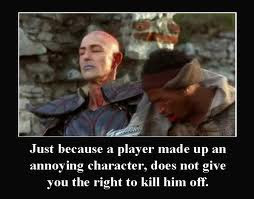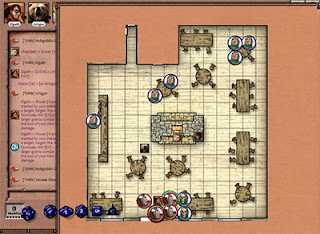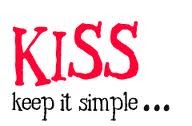But that's not what I'm blogging about at any length today. No, all this Pathfinder gaming has made me reevaluate alot of things in relation to old school and what it is and what I am. I've written alot about this before, but it bears repeating now, since so much has been better assimilated with time. I've always wondered if old school meant rules lite. I personally have never been a rules lite gamer. I liked a depth to the rules that in my opinion enriched the game. I suppose that's why I always played AD&D instead of BX, even though I had both sets. But so much of the old school community are into rules lite role playing. Where did that leave me?
Well, not really out of the genre. I knew I preferred a hard core game. And by that I mean a deadly and extremely challenging sort of gaming that caused plays to dig out the best in themselves in order to stay alive. This often takes the form of sinister traps; incredibly intelligent, responsive and evil adversaries; horridly adverse environmental challenges; a weird and wonderful fantasy world full of newness and bizarre magic; magic items are rare, dangerous and powerful and unfortunately often cursed or tainted. The tropes that drive my adventures aren't really the high fantasy of Tolkien as much as the weird strangeness of Jack Vance, HP Lovecraft, Clark Ashton Smith, Arthur Machen, Michael MoorCock, Star Trek TOS, Dr. Who, Lin Carter, L. Sprague DeCamp, Robert Lyn Asprin and others. If it gives you any idea of what I am talking about my favorite adventures were the S series from the AD&D period. Especially Tomb of Horrors and Expedition to Barrier Peaks. I am famous for inventing monsters not in the books, magic items that while they give a powerful ability or two, also tended to be possess by evil spirits, cursed by twisted magic or linked to some nasty demon or two; and for my blatant over use of dismembering traps; and save vs death poison. Good stuff that.
So where the heck did I fit? Hard to say, but my games had a certain old school feel reminiscent of early Greyhawk from what I could surmise based on reading old accounts of such gaming and talking to gamers even older than me. I wasn't alone--just a bit of a rare bug. A love of baroque, gothic rules structures as twisted and labyrinthine as the dungeons they spawned. I personally loved the massive expansion of the 2e period, even if I didn't like some of the rule changes.
Well, not long ago I ran across Fourthcore. Fourthcore is a concept or gaming genre that supports 4th edition dungeons and dragons, but from more of an old school mindset. In fact for a detailed summary of what Fourthcore is all about read their manifesto. To summarize here Fourthcore basically consists of the following assumptions:
- Adventures should be DIFFICULT
- Adventures should be DEADLY
- Magic and treasures should be GREAT
- Everything should be OVER THE TOP
- The world should be BLEAK
- One word: DEATH TRAP DUNGEONS!!!! Okay three words with lots of exclamation points
- GAMIST
So what does this have to do with Pathfinder? Well it has everything to do with my Pathfinder. Because this is the way I play, and currently I am playing Pathfinder. So I suppose you could say I'm playing "Pathcore". Which was the point of my last few published posts back in early November. That gaming sweet spot for me that combines the best of various resources that support my style of gaming. Just built on a Pathfinder base. There are a number of gamers doing just this right now. Check out the Fourthcore site and also new adventure designers like Stephen Newton at Thick Skull Adventures. Goodman Games did the same thing for 3.5 with their DCC line of adventures. Though Goodman is now headed more towards his new game DCC RPG.
Which, btw I'm really looking forward to. I've already got my copy ordered. It will give me all sorts of food for my style of gaming. Even Stephen is thinking about heading that direction. But I'm sticking with PF, and it's rule heavy gamist structure--I'm coming to like it quite a lot. It's just that the DCC RPG will be in my stack of add ins that make Pathfinder Pathcore for me and my gamers. Good stuff that.






































